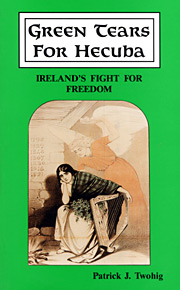
Prologue
Sean Keenan died on the Fourth of March, 1993, and was buried on the Sixth. Who was Sean Keenan? 'Veteran Republican', the paper said, 'and honorary Vice-President of Republican Sinn Fein, who was chairman of the Citizens' Defence Committee in Derry's "Bogside" in 1969-70'. I knew Sean Keenan. I made the acquaintance, but only slightly, of that aloof, brooding little man, ex-County Derry footballer, when, in some peculiar fashion now of little interest, I found myself A.D.C. and driver to Paddy Doherty, the 'King of the Bogside', with a reserved hot-line to the British military commander in the City, at Number Ten Westland, throughout one hectic month in 1969 during and subsequent to the event known to a watching and waiting world as 'The Battle of the Bogside'.
Sean Keenan said to me, more to himself 'I want to be free for one hour before I die!'. Well, he wasn't, but nine months after his death a 'Joint Declaration' was signed (15 December, 1993) by the British Prime Minister and the Irish Taoiseach which seemed to indicate that he had died just a little too soon. He had spent sixteen years of his life in prison without trial. Now, in whatever afterlife he reposes, whatever Valhalla or Hades or theologically adjustable haven reserved for incorrigible patriots, it would be of great interest to note, on this the first day of the New Year, whether he nods his head in approval or shakes it in disbelief at the present indecisive maunderings of the two leading politicians concerned.
One way or the other, in peace and reconciliation or in further futile strife, I am glad to have known a great Irishman named Sean Keenan. I hereby dedicate this work to his memory, as well as to the memory of the men who fought and the people who endured throughout the period covered in the text and usually referred to as 'the time of the Black and Tans'.
Patrick J. Twohig,Churchtown,Mallow.1 January, 1994.